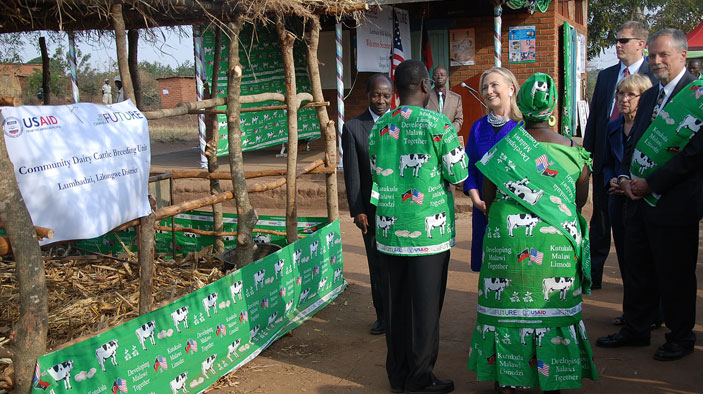Secretary of State Clinton Lauds Malawi Dairy Milk Bulking Group
August 14, 2012
U.S. Secretary of State Hillary Clinton last week praised a community-managed dairy enterprise in Malawi that is helping small farmers to increase their incomes and communities to live more nutritiously.
“For the past decade, the United States has been supporting Malawi’s dairy sector, including this center,” Clinton said during a stop at the Lumbadzi Milk Bulking Group. “And thanks to your work and the support we have given you, Malawi’s milk production has increased 500 percent. Thousands of farmers have benefited.”

The Lumbadzi center—supported by the Malawi Milk Producers Association (MMPA)—is being upgraded and strengthened further through the recently launched Feed the Future’s Integrating Nutrition in Value Chains project, a three-year effort implemented by DAI and funded by the U.S. Agency for International Development (USAID). As part of her visit, Clinton donated Emanuel, a purebred dairy bull to contribute to the community’s dairy cattle breeding program.
“These kinds of projects might not always get the kind of attention that they deserve, but they are making a difference in the lives of so many men and women and children here in Malawi,” Clinton said. “We can point to lives we have saved and changed, and in the long run, I am so proud of that, because that’s what matters.
“Government-to-government relations are, of course, very important, and historically, traditionally, that’s what we’ve worked on. But in the 21st century, it’s people-to-people relations. It is how we reach out and get to know somebody and build relationships and learn and then perhaps help if possible.”
The project is led by DAI in partnership with Save the Children and Michigan State University. The team is taking a comprehensive, market-driven approach to support the dairy, groundnuts, and soya value chains and increase the competitiveness of related farms, firms, and industries. By integrating agricultural investments with nutritional programming, the project is enhancing agricultural productivity, agro-enterprise profitability, and nutritional outcomes for 275,000 households over three years.
“We want to help agriculture in Malawi get even stronger, so that all the children will have better lives,” Clinton said. “And I particularly thank the women farmers for their hard work, and their families, their husbands, and their children for being part of this successful program.”
RELATED CONTENT:
Haiti President Visits USAID AVANSE Booth at Agriculture Fair
In honor of Agriculture and Labor Day, the President of the Republic of Haiti, Jovenel Moïse, recently visited AVANSE exhibition at the Agricultural Fair held in northeast Haiti.
Read More